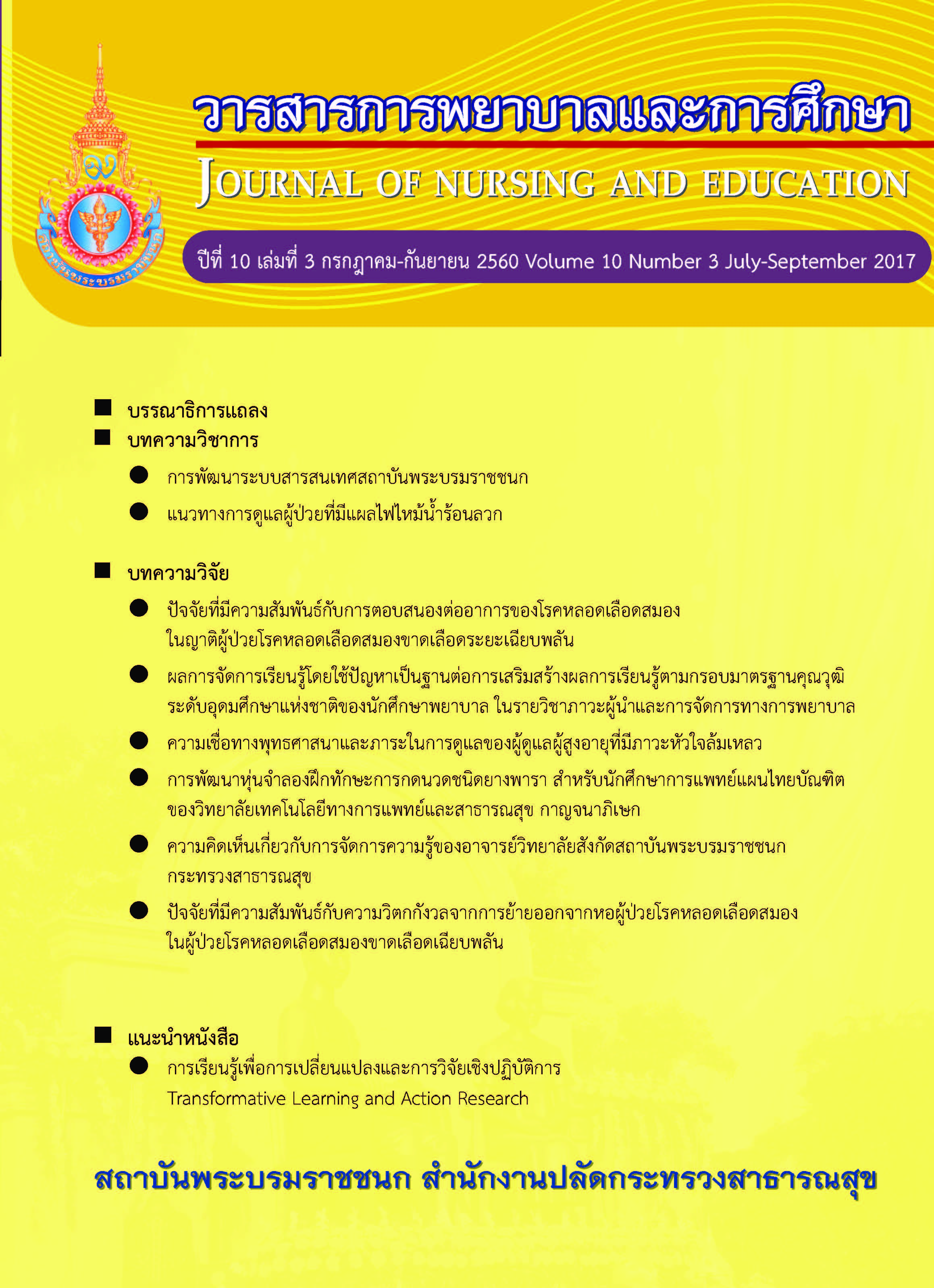ผลการจัดการเรียนรู้โดยใช้ปัญหาเป็นฐานต่อการเสริมสร้างผลการเรียนรู้ ตามกรอบมาตรฐานคุณวุฒิระดับอุดมศึกษาแห่งชาติของนักศึกษาพยาบาล ในรายวิชาภาวะผู้นำและการจัดการทางการพยาบาล
Effects of Problem-based Learning to Enhance Learning Outcome in Accordance with Thai Qualifications Framework for Higher Education of Nursing Students in the Subject of Leadership and Nursing Management
บทคัดย่อ
บทคัดย่อ
การวิจัยครั้งนี้เป็นการวิจัยกึ่งทดลองมีวัตถุประสงค์เพื่อ 1) ศึกษาผลการเรียนรู้ตามกรอบมาตรฐานคุณวุฒิระดับอุดมศึกษาแห่งชาติในรายวิชาภาวะผู้นำและการจัดการทางการพยาบาล และ 2) เปรียบเทียบผลการเรียนรู้ตามกรอบมาตรฐานคุณวุฒิระดับอุดมศึกษาแห่งชาติก่อนและหลังการเรียนรู้โดยใช้ปัญหาเป็นฐานของนักศึกษาพยาบาล กลุ่มตัวอย่างเป็นนักศึกษาพยาบาลศาสตร์ชั้นปีที่ 4 มหาวิทยาลัยวลัยลักษณ์ จำนวน 71 คน เครื่องมือที่ใช้เป็นแบบสอบถามผลการเรียนรู้ตามกรอบมาตรฐานคุณวุฒิระดับอุดมศึกษาแห่งชาติต่อการเรียนรู้โดยใช้ปัญหาเป็นฐาน ลักษณะเป็นแบบมาตราส่วนประมาณค่า มีค่าความเที่ยงเท่ากับ 0.94 ผู้วิจัยเก็บข้อมูลโดยใช้แบบสอบถามผลการเรียนรู้ตามกรอบมาตรฐานคุณวุฒิระดับอุดมศึกษาแห่งชาติก่อนและหลังจัดการเรียนรู้โดยใช้ปัญหาเป็นฐาน วิเคราะห์ข้อมูลโดยการหาค่าความถี่ ค่าเฉลี่ย ค่าเบี่ยงเบนมาตรฐาน สถิติทดสอบทีและการวิเคราะห์ข้อมูลเชิงเนื้อหา ผลการวิจัยพบว่า
1) คะแนนเฉลี่ยผลการเรียนรู้ตามกรอบมาตรฐานคุณวุฒิอุดมศึกษาก่อนและหลังการเรียนรู้โดยใช้ปัญหาเป็นฐานโดยรวมเพิ่มขึ้น (= 4.05 , SD= .37; = 4.34 , SD= .34 ) เมื่อพิจารณาในรายด้านพบว่าคะแนนเฉลี่ยผลการเรียนรู้ตามกรอบมาตรฐานคุณวุฒิระดับอุดมศึกษาแห่งชาติหลังการเรียนรู้โดยใช้ปัญหาเป็นฐานที่สูงกว่าด้านอื่น ๆ คือ ด้านความสัมพันธ์ระหว่างบุคคลและความรับผิดชอบ (= 4.59, SD= .41) และด้านคุณธรรม จริยธรรม (= 4.51, SD= .36) ตามลำดับ
2) เปรียบเทียบคะแนนเฉลี่ยผลการเรียนรู้ตามกรอบมาตรฐานคุณวุฒิระดับอุดมศึกษาแห่งชาติโดยรวมหลังการเรียนรู้โดยใช้ปัญหาเป็นฐานสูงกว่าก่อนเรียนอย่างมีนัยสำคัญทางสถิติ (t= -6.85, p<.001) เมื่อพิจารณารายด้านพบว่า คะแนนเฉลี่ยด้านคุณธรรม จริยธรรม ด้านความรู้ ด้านทักษะทางปัญญา และด้านความสัมพันธ์ระหว่างบุคคลและความรับผิดชอบหลังการเรียนรู้โดยใช้ปัญหาเป็นฐานสูงกว่าก่อนเรียนอย่างมีนัยสำคัญทางสถิติ (t= -5.52, p<.001 ; t = -6.72, p<.001 ; t = -4.83, p<.001; t = -5.32, p<.001)
3) ความคิดเห็นของนักศึกษาจากการเรียนรู้โดยใช้ปัญหาเป็นฐานทำให้ได้พัฒนาตนเองมากขึ้นโดยเฉพาะด้านความรับผิดชอบ ความซื่อสัตย์ ความตรงต่อเวลา การวิเคราะห์สถานการณ์ การเชื่อมโยงข้อมูล ความเป็นผู้นำ การทำงานเป็นทีม ทักษะการแก้ปัญหา การสื่อสาร การนำเสนอและการรับฟังความคิดเห็นของสมาชิกกลุ่ม
ข้อค้นพบจากงานวิจัยครั้งนี้แสดงให้เห็นว่าการจัดการเรียนรู้โดยใช้ปัญหาเป็นฐานช่วยพัฒนาผลการเรียนรู้ตามกรอบมาตรฐานคุณวุฒิระดับอุดมศึกษาแห่งชาติได้เป็นอย่างดี ดังนั้นอาจารย์จึงควรสนับสนุนให้มีการจัดการเรียนรู้โดยใช้ปัญหาเป็นฐานสำหรับนักศึกษาพยาบาลต่อไป
ABSTRACT
This research aims to study learning outcome of Thai Qualifications Framework (TQF) for higher education of nursing students in the Subject of Leadership and Nursing Management, compare effects of teaching using problem-based learning on learning outcome of TQF in nursing students. Research samples consisted of 71 the fourth-year nursing students in term 1/2016 of the Institute of Nursing, Walailak University. The learning outcome of TQF questionnaire instruments was used to investigate and a test. Reliability of the instruments was at 0.94. The data were collected by the questionnaire instrument. The data were analyzed by frequency, mean, standard deviation, paired sample t-test and content analysis.The results revealed that;
- The overall mean scores of the learning outcome of TQF in nursing students before and after using problem-based learning were increase (= 4.05, SD= .37; = 4.34, SD= .34). In terms of dimensions, after using problem based learning the mean scores of the learning outcome of TQF was higher than others such as interpersonal skills and responsibility (= 4.59, SD= .41) and ethics and morals (= 4.51, SD= .36) respectively.
- The result of comparing the overall mean scores of the learning outcome of TQF was significantly higher than before applying problem-based learning (t= -6.85, p<.001). The mean scores after using problem-based learning in the dimentions of ethics and morals, knowledge, cognitive skills, interpersonal skills and responsibility was significantly higher than before applying problem-based learning (t= -5.52, p<.001 ; t= -6.72, p<.001 ; t= -4.83, p<.001; t = -5.32, p<.001).
- The students’ opinions of the learning outcome after using problem-based learning was outstanding developed in responsibility, honest, punctuality, analyze situation, related data, leadership, team work, problem solving skills, communication, presentation and listen to group’s members.
This study showed that the management of problem-based learning can develop the outcome of TQF learning as well. The nursing students who learned problem-based learning can develop learning achievement. Therefore, the teacher should be encouraged to apply the problem-based learning in the university.
เอกสารอ้างอิง
2. Kaemanee, T. Teaching science: Knowledge for effective learning process. Bangkok: Chulalongkorn University Printing House; 2011. (in Thai)
3. Panich, W. Teacher for disciple : Flipped classroom. Bangkok: S. R. Printing; 2013. (in Thai)
4. Savery, J. R. Overview of problem-based learning: Definitions and distinctions.
Interdisciplinary. Journal of Problem-learning, 2006; 1(1): 8-20.
5. Dolmans, D. H. J. M., Grave, W. D., Wolfhagen, I. H. A. P., & Vleuten Van Der, C. P. M. Problem-based learning: future challenges for educational practice and research. Medical Education, 2005; 39, 732-741.
6. Schmidt, H. G. and Moust, J. H. C. Processes that shape small-group tutorial learning: A review of research. Mastricht : Datawyse Publishing; 2000.
7. Ates, O. and Eryilmaz, A. Factors affecting performance of tutors during problem- based learning implementations. Social and Behavioral Sciences, 2010; 2 (2): 2325–2329.
8. Alavi, C. Problem-based learning in a health sciences curriculum. London: Routledge; 2002.
9. Nursing Council. Institute for nursing and midwifery certification guide: For educational institutions which graduates of bachelor of nursing science program. Nonthaburi: Chuttong Limited; 2013. (in Thai)
10. Race, P. & Brown, S. 500 Tips for tutors (2nd ed). London: Routledge; 2005.
11. Choi, E., Lindquist, R. and Song, Y. Effects of problem-based learning vs, traditional lecture on Korean nursing students’ critical thinking , problem-solving, and self directed learning. Nurse Education Today, 2014; 34: 52-56.
12. Japa, M. Study of learning outcomes according to the Thai Qualifications Framework (TQF) for higher education in nursing community practicum as perceived by students, air force nurses 2012. Air force officer, 2013; 59(2), 37-45. (in Thai)
13. Newman, M. J. Problem-based learning: An Introduction and overview of the key features of the approach. JVME, 2005; 32(1) : 12-20.
14. Yuan, H., Willams, B.A., & Fan, L. A systematic review of selected evidence on
developing nursing students’ critical thinking through problem-based learning.
Nurse Education Today, 2008; 28, 657-663.
15. Ustun, B. Communication skills training as part of a problem-based learning curriculum. Educational Innovation, 2006; 45(10) : 421-424.






